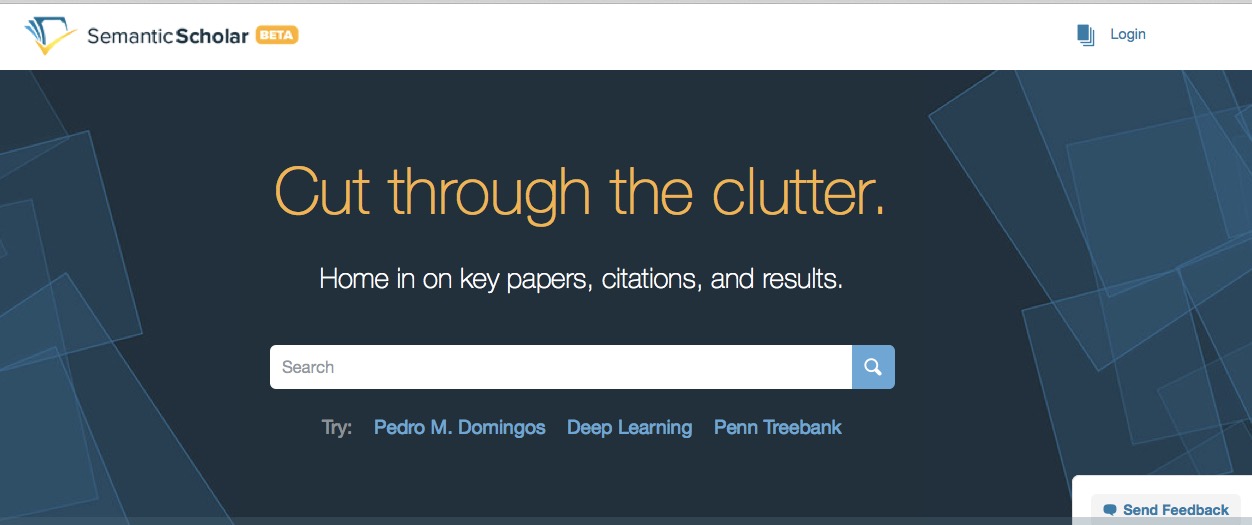Academic Search Tool: Say Hello to Semantic Scholar Launching Today From the Allen Institute for Artificial Intelligence (AI2)
A new search tool to take a look at that just launched in the past few hours. We’re excited to take a look and report back soon.
The leader of Semantic Scholar, Oren Etizioni, has a long history of developing impressive and useful search tools including Decide and Farecast. Another search tool he was involved with was MetaCrawler, a metasearch tool popular in the mid-1990s that was sold to Infospace.
Also exciting to see that Lee Giles, Marti Hearst and others are collaborating with Scholar Search project.
Caveat: As noted below and on the web site, at this point Semantic Scholar only focuses on computer science related articles and documents.
From New Scientist:
Semantic Scholar, which launches today from the Seattle-based Allen Institute for Artificial Intelligence (AI2), can automatically read, digest and categorise findings from the estimated 2 million scientific papers published each year. Up to half of these papers are never read by more than three people. The system aims to identify previously overlooked connections and information.
[Clip]
The system works by crawling the web for publicly available scientific papers, then scanning the text and images within them. By identifying citations and references in the text, Semantic Scholar can work out which are the most influential or controversial papers. It also highlights key phrases found in similar papers, extracting and indexing the datasets and methods each researcher used.
[Clip]
[Our emphasis] At launch, Semantic Scholar is focusing on computer science papers. It will then gradually expand its scope to include biology, physics and the remaining hard sciences, learning from how users interact with software as it goes.
Read the Complete Article
From Geek Wire: “Paul Allen’s AI2 launches search engine designed specifically for scientists”
Right now, most scientists use Google Scholar. AI2 CEO Oren Etzioni said that’s a great service — but it was built about 10 years ago.
“Our goal is to raise the bar,” Etzioni said. “It would be foolhardy to take on Google, actually. … It’s part of our mission of AI for the common good. We’re very interested in helping scientists, not because that’s a good way to make money — it ain’t. Because it’s a good way to make the world a better place for all of us.”
[Clip]
A small group of researchers has been quietly working on the search engine for about a year, but Etzioni said AI2 is now looking to double the size of the Semantic Scholar team and add about 15 workers across the entire organization.
Read the Complete Article
See Also: From the Official News Release
With Semantic Scholar computer scientists can:
- Home in quickly on what they are looking for, with advanced selection filtering tools. Researchers can filter search results by author, publication, topic, and date published. This gets the researcher to the most relevant result in the fastest way possible, and reduces information overload.
- Instantly access a paper’s figures and findings. Unique among scholarly search engines, this feature pulls out the graphic results, which are often what a researcher is really looking for.
- Jump to cited papers and references and see how many researchers have cited each paper, a good way to determine citation influence and usefulness.
- Be prompted with key phrases within each paper to winnow the search further.
Direct to Search the Semantic Scholar Database

See Also: Base
Another academic search engine with data about more than 80,000,000 documents, many open access. From the Bielefeld University in Germany. More about BASE at the bottom of this post.
Filed under: Data Files, Digital Preservation, Journal Articles, News, Open Access, Patrons and Users
About Gary Price
Gary Price (gprice@gmail.com) is a librarian, writer, consultant, and frequent conference speaker based in the Washington D.C. metro area. He earned his MLIS degree from Wayne State University in Detroit. Price has won several awards including the SLA Innovations in Technology Award and Alumnus of the Year from the Wayne St. University Library and Information Science Program. From 2006-2009 he was Director of Online Information Services at Ask.com.


